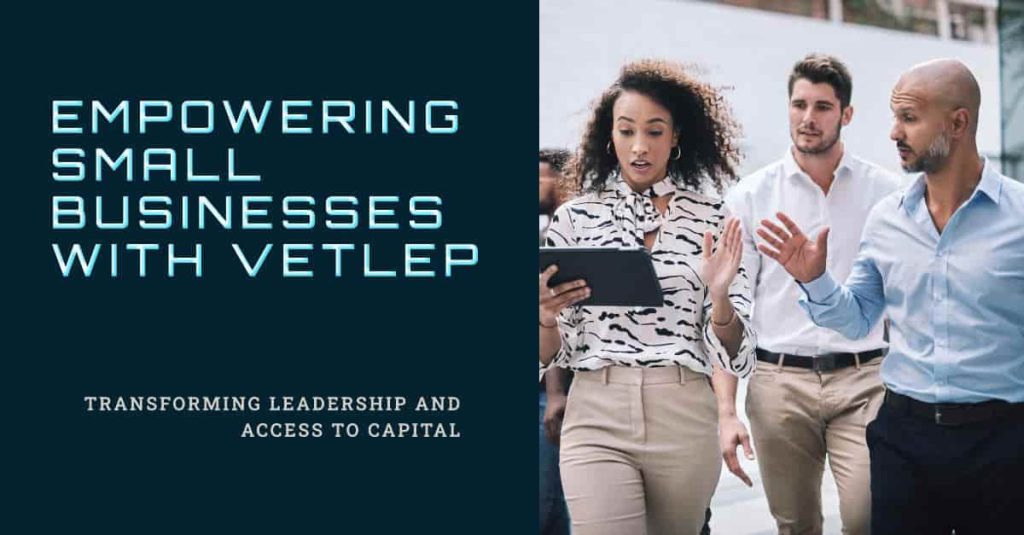
How Public-Private Partnerships Enhance Access to Capital for Small Business Growth: The Role of VETLEP in Entrepreneurial and Transformational Leadership
Small businesses form the backbone of economies worldwide, driving innovation, creating jobs, and fostering economic resilience. However, accessing capital remains a significant challenge for many entrepreneurs, particularly those in developing or underserved regions. Public-Private Partnerships (PPPs) have emerged as a vital mechanism to address these challenges, combining the strengths of both the public and private sectors to facilitate financial inclusion and economic development. A noteworthy example of such a partnership is the Valdymas Entrepreneurial and Transformational Leadership Empowerment Program (VETLEP), a unique initiative that not only provides loans for small businesses but also incorporates a savings-driven model. This essay explores how PPPs like VETLEP enhance access to capital for small business growth, with a particular focus on VETLEP’s holistic approach to empowerment through savings, financial literacy, and leadership development.
The Importance of Access to Capital for Small Business Growth
Access to capital is a crucial factor in the growth and sustainability of small businesses. Capital allows entrepreneurs to invest in equipment, expand operations, hire employees, and innovate, all of which contribute to the long-term success of their businesses. However, many small businesses, particularly those in underserved regions, face significant barriers to accessing traditional financing. Commercial banks often require collateral, stringent credit checks, and a proven financial track record—requirements that many small businesses, especially startups, cannot meet.
Public-Private Partnerships (PPPs) have become an effective tool for addressing these barriers. By combining government support with private sector efficiency and expertise, PPPs can provide small businesses with access to the financial resources they need while also mitigating the risks for lenders. In many cases, PPPs offer loan guarantees, subsidized interest rates, or direct loans to entrepreneurs who may not qualify for traditional bank loans.
Understanding Public-Private Partnerships (PPPs)
Public-Private Partnerships are collaborations between government entities and private sector organizations designed to address public needs through shared resources, expertise, and risks. In the context of small business financing, PPPs aim to bridge the gap between traditional financial institutions and small businesses by offering alternative sources of capital. These partnerships are often structured to reduce the risk for private lenders, making it easier for them to offer loans to businesses that might otherwise be deemed too risky.
PPPs for small business financing can take various forms, including:
📌 Loan Guarantee Programs: The government guarantees a portion of the loan, reducing the risk for private lenders and encouraging them to extend credit to small businesses.
📌 Direct Loans: Governments or private entities within the partnership provide loans to small businesses at favorable terms, often with lower interest rates or no collateral requirements.
📌 Venture Capital and Equity Partnerships: In some cases, PPPs may involve venture capital funds, where the public and private sectors jointly invest in small businesses with high growth potential.
📌 Training and Capacity Building: Beyond financial support, many PPPs offer additional services such as business training, mentorship, and networking opportunities to ensure that entrepreneurs can effectively use the capital they receive.
The Role of VETLEP in Enhancing Access to Capital
VETLEP (Valdymas Entrepreneurial and Transformational Leadership Empowerment Program) represents a model PPP uniquely positioned to enhance access to capital for small businesses in a holistic way. Unlike traditional financing programs that focus solely on lending, VETLEP integrates financial education, entrepreneurial development, and leadership empowerment into its program. This comprehensive approach ensures that entrepreneurs are not only given access to capital but are also equipped with the knowledge, skills, and tools to use that capital effectively.
- 1️⃣ Collateral-Free Loans: Expanding Access to Capital
One of the most significant barriers to small business financing is the requirement for collateral, which many entrepreneurs, particularly in developing regions, do not have. VETLEP addresses this issue by offering collateral-free loans to small businesses. This approach is crucial in leveling the playing field for entrepreneurs who may have strong business ideas and potential but lack the assets or financial history to secure traditional loans.
By providing loans without collateral, VETLEP removes one of the most significant obstacles to small business growth, allowing entrepreneurs to invest in their businesses, scale operations, and create jobs. Additionally, the absence of collateral requirements reduces the financial burden on entrepreneurs, enabling them to focus on growing their businesses rather than worrying about losing personal assets in the event of default.
- 2️⃣ Savings as a Pillar of Financial Empowerment
In addition to providing access to capital, VETLEP prioritizes savings as a key component of its empowerment program. Savings play a critical role in the financial stability and sustainability of small businesses. By encouraging entrepreneurs to develop a habit of saving, VETLEP helps them build a financial safety net that can be used to weather economic downturns, manage cash flow, and make informed investment decisions.
Savings not only provide a cushion during difficult times but also help entrepreneurs plan for the future, enabling them to reinvest in their businesses, expand operations, and pursue new opportunities. VETLEP’s focus on savings ensures that entrepreneurs are not solely dependent on external financing but can also rely on their own resources to sustain and grow their businesses.
Through VETLEP’s savings-focused model, entrepreneurs can:
📌 Manage cash flow effectively: By having a savings buffer, businesses can manage daily operations without the constant pressure of relying on loans or external funding.
📌 Make informed investment decisions: Savings provide the flexibility to invest in opportunities as they arise, whether it’s upgrading equipment, expanding inventory, or hiring new staff.
📌Weather financial storms: Economic downturns, unexpected expenses, or slow business periods are less likely to threaten the survival of a business with a solid savings foundation.
📌 Achieve long-term sustainability: Entrepreneurs who incorporate savings into their financial strategies are better positioned for long-term growth and stability.
- 3️⃣ Entrepreneurial Development and Leadership Empowerment
A key differentiator of VETLEP is its focus on entrepreneurial development and leadership empowerment. Access to capital is only part of the equation; without the skills and knowledge to manage that capital effectively, many small businesses fail to reach their full potential. VETLEP addresses this by offering comprehensive business training, mentorship, and leadership development programs.
By equipping entrepreneurs with the tools to succeed, VETLEP ensures that they can:
📌 Develop a savings habit: Building financial discipline and a habit of saving are critical skills that contribute to long-term success.
📌 Receive comprehensive business training: Entrepreneurs are taught how to manage their businesses efficiently, from financial management to marketing and operations.
📌 Benefit from leadership development: Business owners are trained in leadership skills that enable them to motivate teams, manage growth, and make strategic decisions.
📌 Network with successful business leaders and peers: Networking opportunities provided through VETLEP help entrepreneurs build valuable connections, share knowledge, and collaborate on business ventures.
This holistic approach to empowerment ensures that entrepreneurs are not only equipped with the financial resources they need but are also prepared to use those resources wisely to drive business growth and contribute to economic development.
The Broader Economic Impact of VETLEP and Similar PPPs
The economic impact of VETLEP and similar PPPs extends beyond individual businesses. By providing small businesses with access to capital and empowering entrepreneurs with financial and leadership skills, these programs contribute to job creation, economic diversification, and poverty reduction. Small businesses are key drivers of economic growth, particularly in developing regions where large-scale industries may be scarce. By supporting small businesses, PPPs like VETLEP help stimulate local economies, increase consumer spending, and improve overall economic resilience.
Moreover, the emphasis on savings and financial literacy ensures that businesses are better prepared to navigate economic challenges, reducing the risk of failure and contributing to long-term stability. As more small businesses succeed and expand, the ripple effects are felt throughout the economy, from increased tax revenues to improved infrastructure and social services.
Public-Private Partnerships such as VETLEP play a critical role in enhancing access to capital for small business growth. By offering collateral-free loans, emphasizing the importance of savings, and providing comprehensive entrepreneurial and leadership development, VETLEP equips entrepreneurs with the tools they need to succeed. The program’s holistic approach not only supports business growth but also fosters financial empowerment, economic stability, and long-term sustainability. As more PPPs adopt similar models, the potential for small businesses to drive economic development and transformation will continue to grow, contributing to a brighter future for communities around the world.
Bibliography
- World Bank. (2017). Public-Private Partnerships: A New Way for Small Business Financing [www.worldbank.org](http://www.worldbank.org).
- Small Business Administration (SBA). (2020). *The Role of Loan Guarantees in Small Business Growth. Washington, D.C.
- Ghana Statistical Service. (2021). Impact of Agricultural Cooperatives on Local Economies. Accra: GSS Press.
- Kiva. (2022). Case Studies in Microfinance: Empowering Women Entrepreneurs. San Francisco: Kiva Reports.



